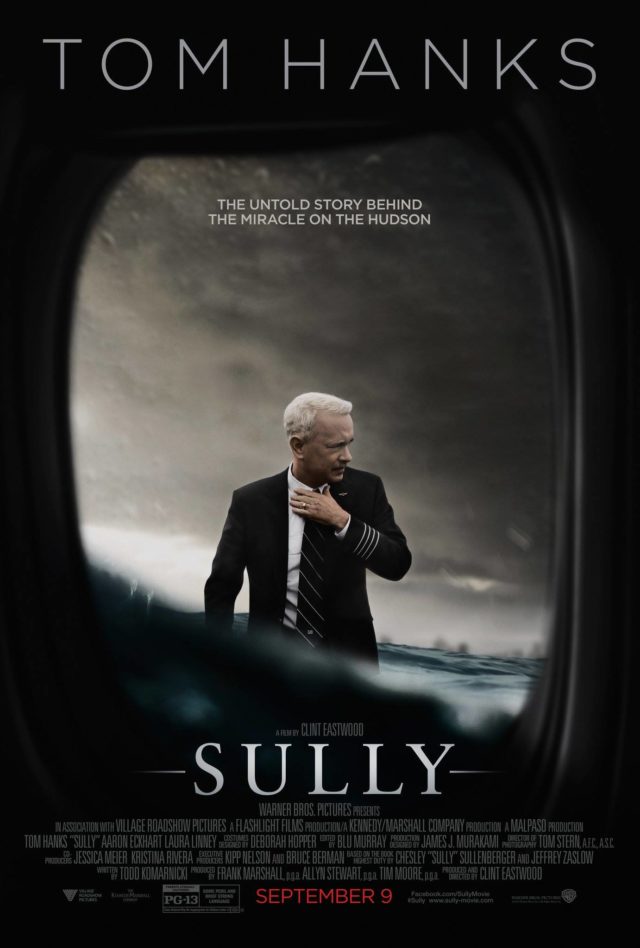Movie Breakdown: Sully (Noah)
Pre-Screening Stance:
Let me be frank: I don’t love Clint Eastwood. Outside of his political stances, I feel like Eastwood has been resting on his laurels for much of my adult life. The man hasn’t produced a film in years that isn’t marred by a bad script and lazy directing. Though the trailers for Sully have been better than average, I’m having a hard time getting past Eastwood’s “recent” track record.
Post-Screening Ramble:
I walked out of Sully with a bad taste in my mouth. It isn’t a good film, instead it’s a plodding, snooze-inducing two hour slog buoyed only by an all-time great actor, Tom Hanks, doing what he can with a script that never figures out what it is. Clint Eastwood, I think, wanted to make a film that dissected the idea of being a hero in an era dominated by 24-hour news and the media trolls who cling to it. And for a moment, in the beginning, after Captain Sully has impressively landed a plane on the Hudson River, saving 155 people in the process, it is. For a moment, with Tom Hank’s reserved, very interior performance leading the way, you could almost think that Eastwood is back in the game, showing us, in today’s modern world, a true hero slowly brought to his knees by our society’s unyielding need to find the cracks in every glowing shield. It’s a great idea for a film, but, clearly, it isn’t the film that Eastwood wanted to make. Instead, Sully is a film that seems intent only to show how The Man (here played by the National Transportation Safety Board – NTSB) tried to bring a real American hero to his knees. You can almost feel Eastwood’s weathered visage, and his own aversion to government, looming in the background, possibly smiling, possibly whispering, “Oh, you government bastards, you’ll never take my sweet American hero away from me.” Sully, in a sort of low-tempo, low-energy airplane detective tale (with actual interesting characters replaced by speech after speech of incomprehensible plane lingo) has to weather the storm of the opening stages of PTSD, while trying to prove his, I guess you’d call it, uh, innocence. Eastwood’s palette stopped having shades of grey a long time ago though, so instead of it being a careful discussion about what bureaucracy can do to our image of a hero, we get a film about a good guy fighting a bad organization – in this case a group of bland white people just, well, doing what they’re supposed to do in the wake of a miraculous, unprecedented, plane-related event. And hell, in the hands of a director who actually gives a shit, that could’ve been a nuanced piece of filmmaking. But Eastwood gave up long ago, and this film, outside of the tepid script, is, well, truly boring. The audience keeps finding itself in cardboard box conference rooms and hotel rooms and courtrooms, just listening to people argue about the minutia of plane flight. It’s like Mr. Smith Goes to Washington, but if his speech at the end was just ten paragraphs from a law textbook. What really brought me, the hero of this review, to my knees, a fifteen minute scene at the end where, for what reason, no one will know, Eastwood shows the audience the human-simulation of the flight, intended to disprove Sully’s claim that landing on the water was the only possible option. It’s literally a single shot of two amateurs actors, sitting in a fake plane that’s flying into the worst of early 90s computer graphics. The first time he does it, I thought, “What a strange choice,” but when Eastwood repeats the same thing three more times, back-to-back, well, that’s when the bad taste started forming in my mouth. Because Sully really isn’t even a movie, it’s a lengthy, vitriolic diatribe against government, technology, and progress stuffed through the lens of a director who clearly thinks all of this is, well, pretty shit. Captain Sully, hands down, is the definition of an American hero, a man who went against his training to do what he thought would save the people he was responsible for, and he did. Framing this as battle between hero and evil government, turns the focus away from the most interesting part of the story, the namesake of the film, and what doing what he did, well, did to him. When the film ended with, spoiler alert, Captain Sully foiling the baddies and turning to his co-captain (Aaron Eckhart with a huge mustache) and laughing at a dad joke, I made the “pfff” sound. This is when I really noticed the bad taste in my mouth.
One Last Thought:
Can we call for a moratorium on Clint Eastwood? Just in general. No more public appearances, no more films for five years or at least until he stops supporting Donald Trump.



How about we have a five year moratorium on reading your movie reviews that inject the politics of the director unnecessarily into a movie review?
I will shorten that moratorium by half if you admit that this is the worst written sentence of 2016:
“What really brought me, the hero of this review, to my knees, a fifteen minute scene at the end where, for what reason, no one will know, Eastwood shows the audience the human-simulation of the flight, intended to disprove Sully’s claim that landing on the water was the only possible option.”
49 words, seven commas, and I think you declared yourself the hero of the review, but I cannot tell due to the lack of clarity. Of course, focusing on Clint’s politics clouded your perspective before you sat down.